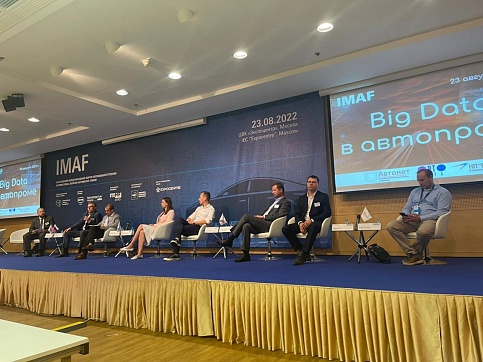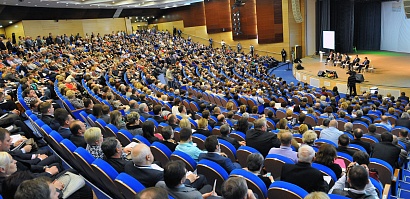Results of the round table of NTI "Autonet" - "Big Data in the automotive industry"
24 august 2022

24 august 2022
On August 23, within the framework of the Moscow International Automotive Forum IMAF-2022, a round table was held: "BIG Data in the automotive industry", organized by the working group of the NTI "Autonet".
The moderator was the head of the direction of the NTI "Autonet" Vadim Sakhonko.
The session was attended by:
Dmitry Rudenko, General Director, Absolut Insurance
Vladimir Leonov, General Director of AVTODATASPACE
Alexey Kasatkin, Head of the Simble Project Office
Denis Klimanov, Leading Design Engineer, AVTOVAZ JSC
Evgenia Ponomareva, Manager for Work with International Technology Partners, Kaspersky
Sergey Naumovsky, Expert, Association "Russian Automobile Dealers (ROAD)"
Sergey Burgazliev, Independent expert on the automotive and transport industry.
At the session, leaders and experts of the automotive, transport, digital and insurance industries discussed what adjustments the current geopolitical situation has made to the development of technologies, what barriers, drivers and trends of the automotive data market exist at the moment, as well as problems of cybersecurity and legislative regulation of big automotive data.
Dmitry Rudenko was the first to speak. He spoke about how big data is used in auto insurance. According to Dmitry, insurance companies will be consumers of big automotive data. Thanks to this data, it has already become possible to track driving style and assess the risks of an insured event. However, despite the demand, there is still a shortage of supply in the market. Ideally, all data should be collected in one place, so that all participants have access to them.
Then the floor passed to Alexey Kasatkin, head of the Simble project office. Alexey said that the Simble short-term insurance project is based on an analytical platform that combines various tools necessary to analyze the interaction of each user with the car and the road. Based on the accumulated data, it is possible to rank users, assess the level of risk of the route and possible damage in the event of an insured event, identify deviations in user behavior, and also issue recommendations aimed at reducing the risks associated with the planned trip (parking), improving the efficiency of using the car, reducing the cost of owning a car.
Then the representative of AvtoVAZ JSC, Denis Klimanov, spoke. According to Denis, the consumer should understand how big automotive data can be used.
Vladimir Leonov, General Director of the Avtodata platform operator, AVTODATASPACE company, spoke about the trends of the Russian automotive industry that will be developed in the near future.
The global auto industry is moving towards connectivity and autonomy. I believe that the trend is not limited only to connected and self-driving cars, I want to draw attention to the fact that the federal program for the development of Safe and high-quality Roads is actively underway in the Russian Federation, within the framework of which ITS (intelligent transport systems), including V2X data transmission technology, are being developed in all cities of the Russian Federation. Cars become a data source and when connected to a data network becomes part of the IoT (internet of things) this is another trend. Prerequisites for the creation and import of electric vehicles are also being formed in the Russian Federation. Our platform adapts to any trends, but it is already clear that data needs to be collected, stored and processed. Create an ecosystem capable of creating new business models based on data. We plan to give non-discriminatory access to data to developers, contributing to the goals of Autonet for the formation of new markets.
Sergey Naumovsky, an expert of the ROAD Association, expressed the opinion that the market for big automotive data has gone far beyond telematics and remote diagnostics.
Already, data can be taken from dealer platforms, online platforms, provider platforms and other sources. They can have a result and advantages many times higher.
Also within the framework of the round table, experts discussed the issue of ownership of data collected by "connected" cars.
So, according to the independent expert of the industry "cars and transport" Sergey Burgazliev, the data generated by the car belongs to its owner, and no one should have access to this data without his consent.
To date, the collection, analysis and movement of data around the world has become of great economic importance and the need to protect this data from intruders comes to the fore. So, for example, with the help of an acceleration system, an attacker can accelerate a car to a huge speed at the right moment and send it to one of the objects of increased danger, for example, to a gas station, knock down a person or even fly into a crowd of people at full speed. The possibilities for harm are extremely wide. This can entail enormous financial and human losses, cause serious damage to infrastructure and the economy as a whole.
The manager of work with Kaspersky's international technology partners, Evgenia Ponomareva, believes that security systems should be installed even on mobile applications of interaction with cars.
There are quite a few cases when a car was hacked through a mobile application. That is why protection should be comprehensive.
Following the results of the section, experts agreed that the use of big data is important for the further development of the automotive industry.
The moderator was the head of the direction of the NTI "Autonet" Vadim Sakhonko.
The session was attended by:
Dmitry Rudenko, General Director, Absolut Insurance
Vladimir Leonov, General Director of AVTODATASPACE
Alexey Kasatkin, Head of the Simble Project Office
Denis Klimanov, Leading Design Engineer, AVTOVAZ JSC
Evgenia Ponomareva, Manager for Work with International Technology Partners, Kaspersky
Sergey Naumovsky, Expert, Association "Russian Automobile Dealers (ROAD)"
Sergey Burgazliev, Independent expert on the automotive and transport industry.
At the session, leaders and experts of the automotive, transport, digital and insurance industries discussed what adjustments the current geopolitical situation has made to the development of technologies, what barriers, drivers and trends of the automotive data market exist at the moment, as well as problems of cybersecurity and legislative regulation of big automotive data.
Dmitry Rudenko was the first to speak. He spoke about how big data is used in auto insurance. According to Dmitry, insurance companies will be consumers of big automotive data. Thanks to this data, it has already become possible to track driving style and assess the risks of an insured event. However, despite the demand, there is still a shortage of supply in the market. Ideally, all data should be collected in one place, so that all participants have access to them.
Then the floor passed to Alexey Kasatkin, head of the Simble project office. Alexey said that the Simble short-term insurance project is based on an analytical platform that combines various tools necessary to analyze the interaction of each user with the car and the road. Based on the accumulated data, it is possible to rank users, assess the level of risk of the route and possible damage in the event of an insured event, identify deviations in user behavior, and also issue recommendations aimed at reducing the risks associated with the planned trip (parking), improving the efficiency of using the car, reducing the cost of owning a car.
Then the representative of AvtoVAZ JSC, Denis Klimanov, spoke. According to Denis, the consumer should understand how big automotive data can be used.
Vladimir Leonov, General Director of the Avtodata platform operator, AVTODATASPACE company, spoke about the trends of the Russian automotive industry that will be developed in the near future.
The global auto industry is moving towards connectivity and autonomy. I believe that the trend is not limited only to connected and self-driving cars, I want to draw attention to the fact that the federal program for the development of Safe and high-quality Roads is actively underway in the Russian Federation, within the framework of which ITS (intelligent transport systems), including V2X data transmission technology, are being developed in all cities of the Russian Federation. Cars become a data source and when connected to a data network becomes part of the IoT (internet of things) this is another trend. Prerequisites for the creation and import of electric vehicles are also being formed in the Russian Federation. Our platform adapts to any trends, but it is already clear that data needs to be collected, stored and processed. Create an ecosystem capable of creating new business models based on data. We plan to give non-discriminatory access to data to developers, contributing to the goals of Autonet for the formation of new markets.
Sergey Naumovsky, an expert of the ROAD Association, expressed the opinion that the market for big automotive data has gone far beyond telematics and remote diagnostics.
Already, data can be taken from dealer platforms, online platforms, provider platforms and other sources. They can have a result and advantages many times higher.
Also within the framework of the round table, experts discussed the issue of ownership of data collected by "connected" cars.
So, according to the independent expert of the industry "cars and transport" Sergey Burgazliev, the data generated by the car belongs to its owner, and no one should have access to this data without his consent.
To date, the collection, analysis and movement of data around the world has become of great economic importance and the need to protect this data from intruders comes to the fore. So, for example, with the help of an acceleration system, an attacker can accelerate a car to a huge speed at the right moment and send it to one of the objects of increased danger, for example, to a gas station, knock down a person or even fly into a crowd of people at full speed. The possibilities for harm are extremely wide. This can entail enormous financial and human losses, cause serious damage to infrastructure and the economy as a whole.
The manager of work with Kaspersky's international technology partners, Evgenia Ponomareva, believes that security systems should be installed even on mobile applications of interaction with cars.
There are quite a few cases when a car was hacked through a mobile application. That is why protection should be comprehensive.
Following the results of the section, experts agreed that the use of big data is important for the further development of the automotive industry.
 Autonet
Autonet
